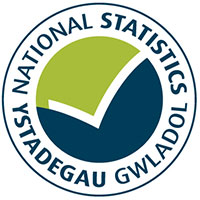Information on people with a learning, physical and sensory disability as at 31 March 2022.
This is the latest release in the series: Local authority registers of disabled people
Main points
Registers of people with learning disabilities [footnote 1]
There were 12,303 people on learning disability registers; 84% were living in community placements (for example, living with parents or family) [footnote 2] and 16% were living in residential establishments (for example, care homes).
Registers of people with physical or sensory disabilities
- There were 45,083 people on physically or sensory disability registers.
- 11,749 people were registered with a visual impairment; of these just over half were registered as severely sight impaired and just under half as sight impaired. [footnote 3]
- 8,847 people were registered with a hearing impairment (without sight impairment).[footnote 4]
- 24,487 people were registered as having a physical disability only. [footnote 5]
Footnotes
[1] one local authority was unable to provide this data for those aged 18 and over and another local authority was unable to provide this data for those aged 65 and over.
[2] two local authorities were unable to provide data for those living in their own home, and one of which was also unable to provide data for those living with parents or family.
[3] one local authority was unable to provide data for people registered with a severe sight impairment and deaf, and people registered with a sight impairment and deaf without speech.
[4] one local authority was unable to provide data for people without visual disability and deaf.
[5] four local authorities were unable to provide data for people registered with a physical disability only.
Note
Under the Social Services and Well-being (Wales) Act 2014 (UK legislation), local authorities are required to establish and maintain registers of people who are ordinarily resident in their area who are sight impaired, severely sight impaired, hearing impaired, severely hearing impaired or have both sight and hearing impairments which in combination have a significant effect on their day-to-day lives. Local authorities must also establish and maintain a register of children who are within the local authority’s area and who are disabled, have a physical or mental impairment which gives rise, or may in the future give rise to, needs for care and support. Local authorities may also maintain a register of adults within their area to whom these same criteria apply.
While it’s a legal requirement for local authorities to maintain disability registers, it is not compulsory for someone with a disability to register themselves with a local authority. This means that the number of people on the registers may be an undercount of the actual number of people with a disability. Furthermore, local authorities do not maintain their registers in a consistent way, which makes it difficult to determine the reliability of the data recorded.
It is thought that the register for those with severe sight impairment is likely to be the most accurate register, as people with this disability need to be on the register to receive certain financial help. However, the figures in this dataset cannot be thought of as a definitive number of people with disabilities.
Further data at local authority level are available on StatsWales.
Quality statement
The data reflects the position on local authority systems on 31 March 2022.
Quality assurance was undertaken with local authorities. Not all local authorities provided complete returns. One local authority was unable to provide data for those with a learning disability aged 18 and over and a further local authority was unable to provide data for those with a learning disability aged 65 and over. Two local authorities were unable to provide data for those with a learning disability living in their own home, one of which was also unable to provide data for those living with parents or family. One local authority was unable to provide data for physically disabled people registered with a severe sight impairment and deaf, people registered with a sight impairment and deaf without speech and people without visual disability and deaf. Four local authorities were unable to provide data for people registered with a physical disability only.
Further information on the quality of these data can be found in the 31 March 2019 statistical release, Local authority registers of disabled people: as at 31 March 2019.
Discontinuation notice
The collection and publication of disability registers data (SSDA900 and SSDA901) will cease after this release.
In its place, an annual person-level data collection for adults will commence from April 2023 alongside a refreshed person-level data collection for children. This is detailed in the Measuring Activity and Performance guidance, issued alongside the Performance Measurement Framework under the Code of Practice in relation to the performance and improvement of social services.
The new Adults Receiving Care and Support Census will mirror the Children Receiving Care and Support Census and offer additional intelligence on adults with a care and support plan, including more robust data on disability. This dataset has been developed through extensive stakeholder engagement and detailed guidance has been produced. The Children Receiving Care and Support Census has also been reviewed with refreshed data requirements for 2023-24.
To reduce burden on local authorities and not to duplicate data collections, the disability register returns are therefore no longer required after 2021-22.
It is anticipated that data from the new Adults Receiving Care and Support Census will be reported in spring 2025.
The person-level collections will not include people who do not have a care and support plan. Further information on disability within the general population is available from the 2021 Census results (Office for National Statistics).
If you are a user of these statistics and have any queries please email the contact below.
Contact
Bethan Sherwood
Email: stats.pss@gov.wales
Rydym yn croesawu gohebiaeth yn Gymraeg / We welcome correspondence in Welsh.

